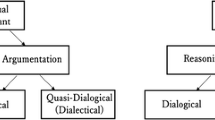Abstract
Reaching an agreement or understanding through argumentation is an important aspect of decision making in a virtual society as well as in our real society. In this paper, we consider ‘compromise’ (Aufheben) and ‘concession’ (weaker Aufheben) as a simple form of Hegelian dialectical reasoning, which we think are desiderata to deliberate or cognitive agents. We then propose an argument-based agent system that allows for the issue modification among agents concerned during argumentation and reaching an agreement or understanding through argumentation with the dialectical reasoning capability. We illustrate its potential usefulness by showing applications to seller and buyer agents and traveling salesman agents in e-commerce.
Similar content being viewed by others
References
Bense, M. (1969). Einführung in die informationstheoretische Ästhetik. Rowohlt Taschenbuch Verlag.
Chesñevar, C.I., A.G. Maguitman, and R.P. Loui. (2000). “Logical Models of Argument.” ACM Computing Surveys 32(4), 337–383.
Edwards, P. (ed.). (1967). The Encyclopedia of Philosophy. Macmillan and Free Press.
Eemeren, F.H., R. Grootendorst, A.F.S. Henkmans, et al. (1996). Fundamentals of Argumentation Theory, A Handbook of Historical Backgrounds and Contemporary Developments. Lawrence Erlbaum.
Kraus, S., K. Sycara, and A. Evenchik. (1998). “Reaching Agreements through Argumentation: A Logical Model and Implementation.” Artificial Intelligence 104, 1–69.
Krause, P., S. Ambler, M.E. Goransson, and J. Fox. (1995). “A Logic of Argumentation for Reasoning under Uncertainty.” Computational Intelligence 11(1), 113–131.
Lange, D.B. and M. Oshima. (1999). “Seven Good Reasons for Mobile Agents.” Communications of ACM 41(3), 88–89.
Loui, R.P. (1987). “Defeat Among Arguments: a System of Defeasible Inference.” Computational Intelligence 2, 100–106.
Maeda, S., C. Guan, and H. Sawamura. (1999). “An Argument-Based Agent System with the Contract Net Protocol.” In J. Liu and N. Zhong (eds.), Intelligent Agent Technology: Systems, Methodologies, and Tools. World Scientific, pp. 99–103.
Maes, P., R.H. Guttman, and A.G. Moukas. (1999). “Agents that Buy and Sell.” Communications of ACM 42(3), 81–91.
Müller, H.J. and R. Dieng (eds.). (2000). Computational Conflicts. Berlin: Springer.
Noriega, P. and C. Sierra. (1998). Agent Mediated Electronic Commerce, Lecture Notes in Artificial Intelligence, Vol. 1571. Berlin: Springer.
Parsons, S., C. Sierra, and N. Jennings. (1998). “Agents that Reason and Negotiate by Arguing.” J. of Logic and Computation 8(3), 261–292.
Prakken, H. and G. Sartor. (1997). “Argument-Based Extended Logic Programming with Defeasible Priorities.” J. of Applied Non-Classical Logics 7(1–2), 25–75.
Rao, A.S. and M.P. Georgeff. (1991). “Modeling Rational Agents with a BDI Architecture.” In Proc. Of Knowledge Representation and Reasoning (KR-91), pp. 473–484.
Rescher, N. and R. Manor. “On Inference from Inconsistent Premises.” Theory and Decision 1, 179–217.
Routley, R. and R. Meyer. (1976). “Dialectical Logic, Classical Logic, and the Consistency of the World.” Studies in Soviet Thought 16, 1–25.
Sawamura, H. (2001). “Computational Realization of Dialectics by Argumentation.” In Working Notes of the IJCAI2001 Workshop on Inconsistency in Data and Knowledge, Seattle, WA, pp. 50–59.
Sawamura, H. and D. Asanuma. (1998). “Mechanizing Relevant Logics with HOL.” In The 11th International Conference on Theorem Proving in Higher Order Logics (TPHOLs'98), Canberra, Australia, Lecture Notes in Computer Science, Vol. 1479. Berlin: Springer, pp. 443–460.
Sawamura, H. and S. Maeda. (2001). “An Argumentation-Based Model of Multi-Agent Systems.” In H. Kangassalo, H. Jaakkola, and E. Kawaguchi (eds.), Information Modelling and Knowledge Bases XII. IOS Press, pp. 137–150.
Sawamura, H., Y. Umeda, and R.K. Meyer. (2000). “Computational Dialectics for Argument-based Agent Systems.” In Proc. of the Fourth International Conference on MultiAgents Systems (ICMAS 2000), Boston, MA. IEEE Computer Society, pp. 271–278.
Sawamura, H., M. Yamashita, M. Inagaki, and Y. Umeda. (2000). “Agents Meet Dialectics.” In Proc. of International ICSC Symposium on Multi-Agents and Mobile Agents in Virtual Organizations and E-Commerce (MAMA 2000), Wollongong, Australia. ICSC Academic Press, pp. 354–360.
Smith, R.G. (1980). “The Contract Net Protocol: Higjer-Level Communication and Control in a Distributed Problem Solver.” IEEE Transactions on Computers 29(12), 1104–1113.
Sycara, K.P. (1990). “Persuasive Argumentation in Negotiation.” Theory and Decision 28, 203–242.
Tambe, M. and H. Jung. (1999). “The Benefits of Arguing in a Team.” AI Magazine, 85–92.
Toda, Y., M. Yamashita, and H. Sawamura. (2001). “An Argument-based Agent System with KQML as an Agent Communication Language.” In Fourth Pacific International Workshop on Multi-agents (PRIMA'2001), Taipei, Taiwan, Lecture Notes in Artificial Intelligence, Vol. 2132. Berlin: Springer, pp. 48–62.
Toulmin, S. (1958). The Uses of Argument. Cambridge Univ. Press.
Umeda, Y. and H. Sawamura. (1999). “Towards an Argument-based Agent System.” In Proc. of 3 rd Int. Conf. on Knowledge-Based Intelligent Information Engineering Systems, Adelaide, Australia. IEEE, pp. 30–33.
Umeda, Y., M. Yamashita, M. Inagaki, and H. Sawamura. (2000). “Argumentation as a Social Computing Paradigm.” In Proc. of 3rd Pacific RIMInt. Workshop on Multi-Agents (PRIMA2000), Melbourne, Australia, Lecture Notes in Artificial Intelligence, Vol. 1881. Berlin: Springer, pp. 46–60.
van Benthem, J. et al. (eds.). (1994). Logic and Argumentation. Royal Netherlands Academy of Arts and Sciences.
Author information
Authors and Affiliations
Rights and permissions
About this article
Cite this article
Sawamura, H., Yamashita, M. & Umeda, Y. Applying Dialectic Agents to Argumentation in E-Commerce. Electronic Commerce Research 3, 297–313 (2003). https://doi.org/10.1023/A:1023431224197
Issue Date:
DOI: https://doi.org/10.1023/A:1023431224197




